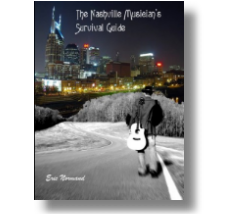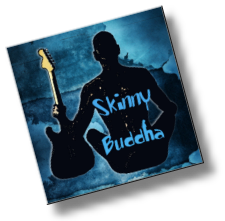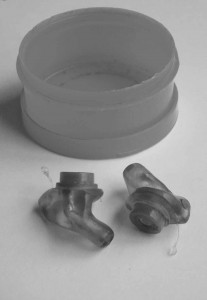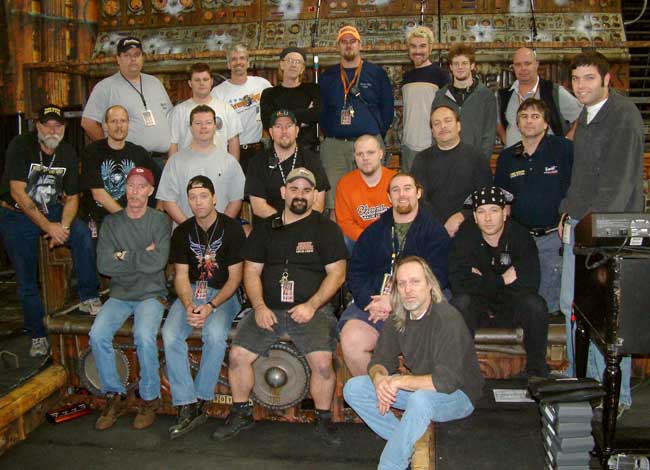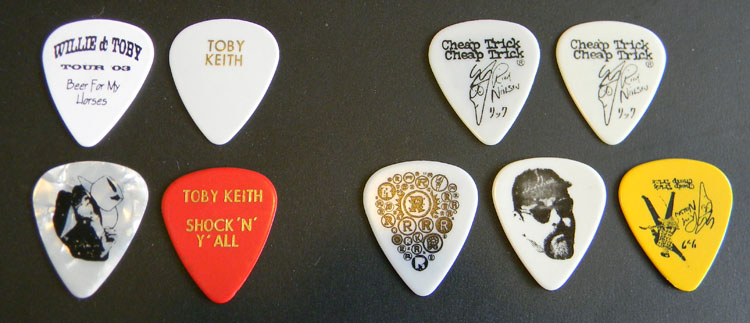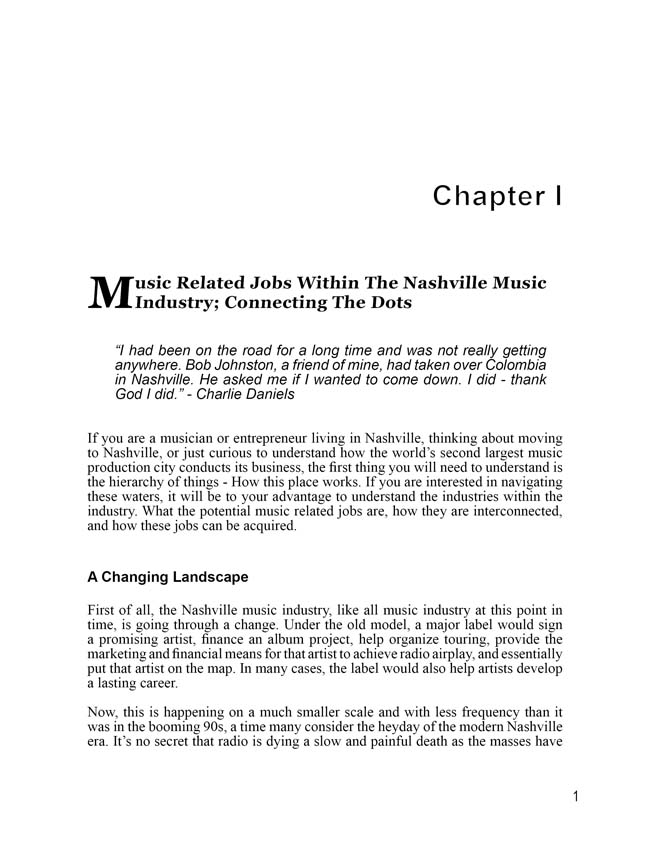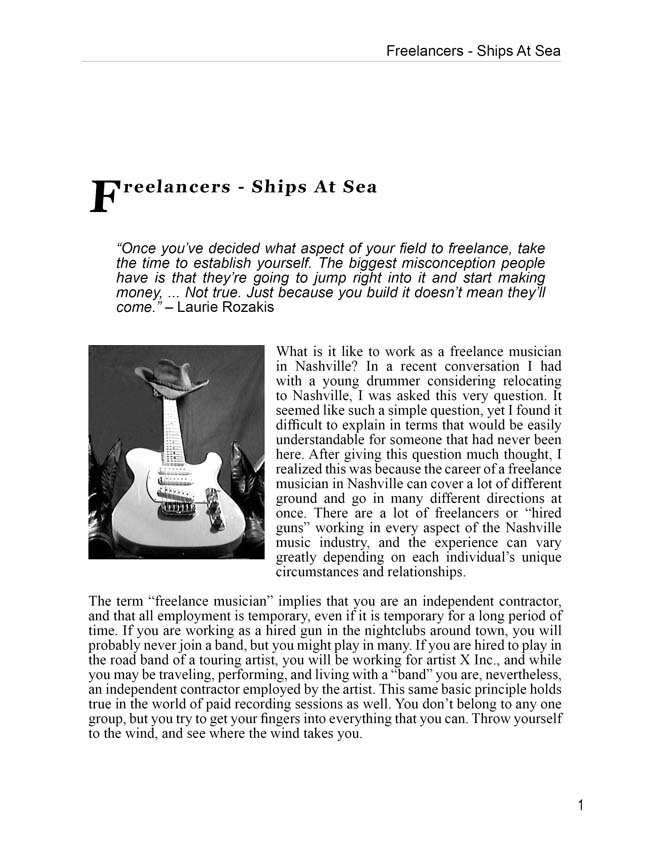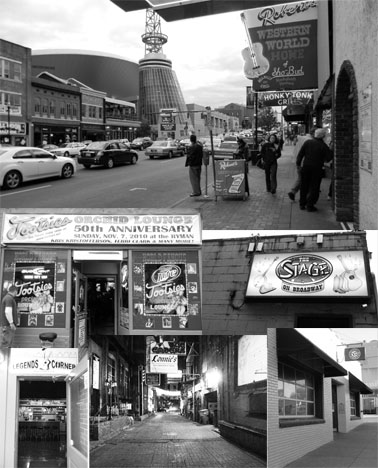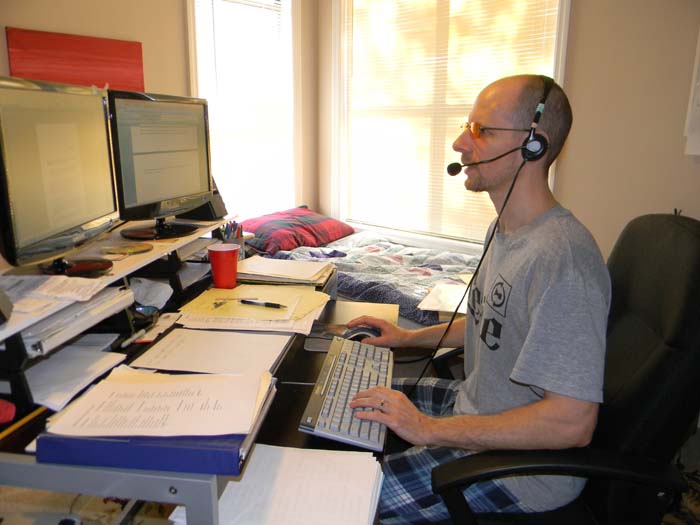
April 18, 2011 – A Date That Will Live in Infamy! (Sorry, I couldn’t resist). Monday, April 18 is our new, official release date for this long overdue book about the Nashville music biz’. When I first embarked on this project, some two years ago, my thoughts were simply “there seems to be a void of information out there about the Nashville music industry, so I’m gonna write a book about it. I mean, how hard can it be?” This was probably the biggest understatement of the century. I had no idea how to write a book at that point in time, I just knew that this book needed to be written. So I wrote, and wrote, and wrote. A year later, I thought I was done writing. At that moment, it seemed finished. I turned my manuscript into a PDF and had a couple of rough drafts printed. As I read through this document I made many corrections and notes, and by the time I was finished, I realized I hadn’t covered all the bases.
So then the project entered phase 2. I had a handful of new chapters that I needed to write, but I also decided to pursue some more interviews, my thought being that this would help broaden the books perspective and appeal. Around that same time I bought the book “Dan Poyntner’s Self Publishing Manual.” After skimming through this fascinating must-read for first-time authors, I began to compile a massive “to do” list. It seems there were dozens, if not hundreds, of little details (many that turned into huge details) I hadn’t thought of – things like: writing back cover copy, purchasing an ISPN number, setting up a P.O. Box, setting it up as an e-book, photo permissions, photo captions, and of course, what is often the most neglected task of authors, marketing.
I also learned in my research that, in general, traditional book deals do very little advertising for their authors. If an author wants their book to sell, unless their name is James Patterson or Stephen King, they must promote their own book. As I am self-publishing, this means that promotion is entirely up to me. Enter Eric, the blogger. Not only has blogging turned out to be a great way to build a readership, it’s been a fun and exciting learning experience as well. Writing a new blog every few days about everything from my shows on the road with Rhett Akins, to the Nashville flood, to self-help tips for musicians, to progress on my book, has been very rewarding. For instance, after writing a blog a few weeks ago about tinnitus, I got a few e-mails from different musicians informing me that they are buying earplugs.
At the same time I began blogging, I began soliciting “chapter reviews” by my peers and experts in the industry, as was suggested in the self-publishing guide. By involving other individuals as contributors, this not only served to further help market the book, but it also greatly improved its content.
The next hurdle turned out to be the interior design. Upon looking into hiring someone for this task, it quickly became obvious it would be extremely expensive. This discovery prompted me to get creative and learn how to do it myself. My wife, Kelly, acquired some tutoring help to learn Adobe’s InDesign software, taught me the basics of what she learned, and then I managed to completely submerge myself in the interior of this book for the past several months.
Well doggone it, I think I finally got it. The design is essentially finished, (just waiting on a few final copy edit changes from one of my copy editors) and will soon be sent to Create Space for final approval and printing – WooHoo! I have been waiting for this moment for almost 2 years. I mean, this project has all but completely taken me over, and as much as I have learned and grown in the process, it will be nice to have my life back.
So in the meantime, check out the beautiful PDF preview (if I don’t say so myself). This will give you some idea about the final version which will be released on Monday, April 18 – A Date That Will Live In… (whoops, sorry, it almost happened again!)
P.S. You can make an advance purchase of your copy of the book to our new online store we just set up. This will not only guarantee immediate delivery the day our first shipment of books arrives, it will also help me pay for some upfront printing costs.
P.S.S You may notice I have put a CD and audio downloads for sale in the store as well. This CD “Songs Without Words” is an instrumental project I recorded in 2003 while I was on a break from the Toby Keith tour. With flavorings of rock, blues, jazz, and Americana, it is an audio snapshot of where I was musically at that moment in time.
As I’m now nearing the end of this book writing project, I’m realizing that I have neglected the Survival Guide site a bit. While I have managed to put up a new blog at least once a week for the past year, it’s been quite some time since I’ve added any new content anywhere else on the site. I’ve wanted to make some changes for a while, and this week, along with the help of the world’s greatest webmaster, Kelly Normand of Just Ducky Designs, we added several new useful features, or “Extras” to the site.
In a recent conversation with a talented singer songwriter from Maine considering moving to Nashville, he inquired about what clubs would be worth checking out. I told him that The Bluebird, The Commodore Grill, and Douglas Corner all hosted popular weekly writers’ nights, and it would serve him well to check these out when he comes down. (BTW -the singer/songwriter’s name is Chris Ross and he’s a great talent, definitely worth checking out! Here’s a link to one of his inspired Youtube performances). But the conversation gave me another idea. My site, that refers to itself as “a central point of information geared towards helping musicians, singers, songwriters, engineers, and others find their way in the Nashville music industry.” was missing something. After a fair amount of digging and e-mailing, I have put together a thorough listing of some of the the most popular writers night’s, blues jams, and open mics in middle Tennessee. More will be added later, but this is certainly enough to get you started. If you host one of these types of events and would like it posted here, just send me an e-mail.
I also created another new section of the site I’ve wanted to develop for quite a while now, “Road Manager Resources”. This will be all practical stuff for tour managing on any level. Right now, if you go to that page, I’m offering a free download of my itinerary template. This is an ideal starting point for you to build your own custom day sheets for your tour or band. Have you ever been on a tour that seemed void of all pertinent information? I have. I’ve been on tours where the tour manager didn’t provide itineraries and didn’t have many answers to the most basic questions. Every day would come and go with most of the tour members asking him questions all day long. Questions like “what time is sound check?”, “what time is dinner?”, “when are we going to the hotel?”, and “what time will we be getting back?” A good itinerary, placed strategically in the front lounge of your bus or van, will not only provide all this info, it gives the tour manager the ultimate response to most questions he or she will be peppered with throughout their day – “Check the day sheet”!
When I get around to it, I plan on adding some more “tour manager goodies”, among them, an easy to use merch spreadsheet, links to some of my favorite “Road manager friendly” websites for booking hotels, flights, rental cars and more, and periodic updates to my “Tour Manager Tip of the Week” (check the site to learn this week’s tip).
I also added a brief excerpt from the book about the Nashville Recording Industry to the site. It’s kind of a precursor to some more extensive writings about this topic that will be explored in the book.
And lastly, I would love your feedback! If there’s something you’d like me to blog or write about, or another feature you would like to see added to the website, let me know and I’ll see what I can do.
So that’s it for now, there’s a lot in the works, and the book is just about to go to print. Check back next week for a major announcement about its release.
P.S. If you live in Middle Tennessee and are looking for something to do this Saturday night (March 5), I’ll be playing at The Fillin’ Station in Kingston Springs, TN with Mike Chapman and Fran Breen – 7 to 11, no cover, tons of fun, come on down!
It was the spring of 2004, and I had just completed my first year as guitar tech for Toby Keith. The whirlwind tour ran almost nonstop from July through February, taking off the months of March through June before firing back up again. So with a few months of downtime ahead of me, I was on the hunt for other gigging opportunities. I started doing some in-town nightclub gigs as a “hired gun” and a few sporadic out-of-town weekends with a few different singers I started working with, basically trying to get my fingers into everything I could. Ultimately, I was searching for another road gig, one in which I would be a player and not a tech.
Then one day I got a call from my friend “D”, asking if I could sub for him on his gig with the Honky Tonk Tailgate Party. “It’s a lot of songs to learn for just one gig, but it will be good for you, and if you can make these guys happy they might call you again someday.” “Count me in; I’d love to do it!” I answered excitedly. “Now, you’ve got to make me look good. They’re nervous about me subbing this out, so you’ve got to nail this gig, and I mean nail it to the floor! This is my reputation on the line as much as it is yours.” I understand” I reassured him “I’ll make you look great!” “And one more thing,” he added “you can use charts if you have to, but it will be better if you don’t.”
The next night I went out to the Fiddle and Steel and picked up a few CDs from Scott Mattevi, their sound engineer who also worked weeknights at the Steel back then. The Honky Tonk Tailgate Party, or HTTP for short, consisted of four artists; Rhett Akins, Daryle Singletary, Chad Brock, and David Kersh, all backed by one five-piece band, and traveling together in one “Camo” bus with a trailer.
I had about 35 songs to learn in about 2 1/2 weeks, and this material spanned four CDs, two containing the studio cuts, and two CDs of a live show, so I listened to these discs over and over again. When I’m learning new music for a new gig, time permitting, my method is as follows:
First, I employ a “SIRDB”, or “self-induced rapidly deployed brainwashing” of the new material (AKA listening to the CDs over and over again until I start hearing them in my sleep). I’ll use this rapid infusion technique for at least a week before even picking up a guitar.
Second, I’ll chart out all of the songs. While this can be time-consuming, it is well worth it as it helps me “visualize” the entire song structure and arrangement, and commits the songs to memory in a different way. It also helps me dissect any figures, breaks, or dynamics that are unique to each song.
Third, I’ll get out my guitar and, using the CDs, begin learning the specific parts and playing along with the songs. I’ll also begin to play the signature licks and intros without the recording, to further commit these most essential song signatures to memory.
So that’s how I spent those three weeks of my life. After the first week or so of nonstop listening, I spent five or six hours a day working on HTTP material, and by the time I was driving to the bus the night before the show, I was ready.
I arrived to the bus a half hour early, loaded my gear into the bays, and met the artists and rest of the band, some of whom I knew already from hanging out and sitting in at The Steel. After a night of sleep in the back lounge (there were 13 riders on this bus) and some downtime the next morning, we were loading in and setting up for outdoor show somewhere in Alabama. After getting the sound dialed in, we began rehearsing some of the material, one artist at a time. And thanks to my patented “SIRDB” technique, other than one piece of paper with a few key signatures written down, I didn’t have a chart in sight. So far so good, I didn’t make any glaring mistakes during the rehearsal, I hadn’t said anything stupid yet, I even managed to make Daryle Singletary laugh with a couple of offhand comments. But I was nervous, nevertheless. Even though I had previously done several shows playing guitar for Vern Gosdin, and had regularly stood on stages in front of 30,000 people when teching for Toby, this was different. I had to make FOUR different artists happy on this night, and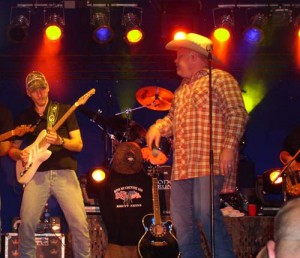 each of these artists had their own unique song style, and performance approach.
each of these artists had their own unique song style, and performance approach.
After sound check/rehearsal, dinner, and showers at the hotel, we were back at the concert site getting ready for the show. Dressed in our best, we hit the stage around eight o’clock and were off and running with David’s set. The outdoor stage faced an open field filled with 1000 or so concert-goers and they quickly became immersed in the show. This show ran like a grid and there was very little space between songs, some songs even running into the next song “medley style”, so I had very little time to think. Before I knew it, David’s set was over and Chad Brock was walking onto the stage as David walked off, the music never stopping. Chad’s set went equally as smooth, and by the time we played his last song of the set, his hit “She Said Yes”, I was starting to feel pretty comfortable on this stage.
Now it was time for Daryle Singletary’s part of the show. Both David’s, and Chad’s sets were of the modern country/pop kind of sound, and this used a style of guitar playing that was more familiar to me. But Daryle’s music was more rooted in traditional country music, so his set required a different approach on the guitar, much more use of the “chicken pickin” technique, and the use of a clean sound throughout. Fortunately, my overkill approach to preparing for this gig came in handy and Daryle looked over at me and smiled at a couple of points during the show, at one point even commenting over the mic “I’d like to introduce Eric Normand filling in on guitar tonight. He’s a Yankee, but we won’t hold that against him… (laughs)…He’s doing a fine job.” The crowd reacted approvingly, and my confidence continued to grow. This was great; I was winning over the bosses!
Finally, an hour and a half into this nonstop barrage of country music fun, it was time for Rhett’s eight or nine songs. Rhett’s music is as much southern rock 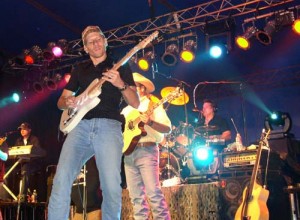 as it is country, and this driving approach was right up my alley. By the end of his set the crowd was in a frenzy and, after a brief pause, we began playing Hank Junior’s “All My Rowdy Friends Are Coming over Tonight” for the encore. The HTTP encore featured all four artists on the stage at once, each taking turns singing verses, and big harmonies on the choruses. We did three or four songs; each followed with a roaring applause, before retreating to the bus.
as it is country, and this driving approach was right up my alley. By the end of his set the crowd was in a frenzy and, after a brief pause, we began playing Hank Junior’s “All My Rowdy Friends Are Coming over Tonight” for the encore. The HTTP encore featured all four artists on the stage at once, each taking turns singing verses, and big harmonies on the choruses. We did three or four songs; each followed with a roaring applause, before retreating to the bus.
After the show, the artists and band members told me I did a great job and that they appreciated how seriously I took the gig. It was a great feeling to know that my mission was successful. A couple of days later I got a call from D. “I heard you did a great job. You even made Singletary happy, and that’s hard to do.” “Thanks, it was tons of fun, all the hard work paid off. I hope it comes up again.”
In the meantime, here’s to “Nailing It to the Floor”!
Last weekend the Rhett Akins tour rode into Harrisburg, Pennsylvania for what would be one of our coolest outings in a while. Fans of Michael Waddell and his popular hunting show “Bone Collector” were about to be treated to a special night of fun and music for the show’s third annual fan club party, and it was 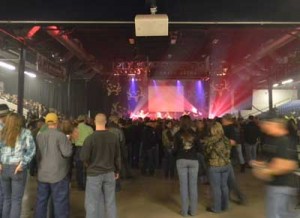 our job to provide some extra “lift” on this particular night. After a long day of setup and preparation the doors finally opened at 7 PM, and the “small arena” at the PA Farm Show Complex began to fill quickly with an excited crowd of hunting aficionados. The Bone Collector crew had laid out quite a spread, and the guests began enjoying the free buffet with a few cold ones while the sounds of Rhett’s hunting songs from “The Brotherhood Album” filled the air in a hall that looked ready for an Aerosmith concert.
our job to provide some extra “lift” on this particular night. After a long day of setup and preparation the doors finally opened at 7 PM, and the “small arena” at the PA Farm Show Complex began to fill quickly with an excited crowd of hunting aficionados. The Bone Collector crew had laid out quite a spread, and the guests began enjoying the free buffet with a few cold ones while the sounds of Rhett’s hunting songs from “The Brotherhood Album” filled the air in a hall that looked ready for an Aerosmith concert.
The place was filling up fast, and soon “Bone Collector” stars Michael, T-Bone, and Nick Mundt, were accompanied by some of the other show organizers on stage to offer a warm welcome to the crowd. After raffling off some free giveaways, the first performer, MCA recording artist Ashton Shepherd took the stage and played a short acoustic set with one of her bandmates, her clear, country voice filling the auditorium. Near the end of her set T-Bone came back out and invited a couple up onto the stage to deliver one more prize giveaway. Apparently, the couple were longtime fans of the show, and what at first looked like a raffle giveaway quickly became a more substantive moment when the fellow dropped to his knees and proposed to his unsuspecting fiancé. The woman had no idea this was going to happen, and was near tears as they danced on the stage to a touching serenade by Ashton. After a few more prize giveaways, Rhett and band took the stage.
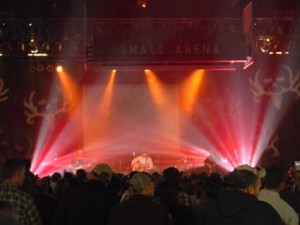 Our first tune was “My Baby Looks Good in Camouflage”, one of several hunting themed songs we would perform from Rhett’s latest album project, and the crowd was instantly singing along with this song that has never even been on the radio. Midway through the set, Rhett announced that we were going to play his song “Bird Dog” and asked if there was anyone in the crowd who knew the song and wanted to come up and sing along. Two fellows in the front row made their way onto the stage and joined Rhett for an “interesting” rendition, after which Rhett announced “Sorry, I won’t do that again.”
Our first tune was “My Baby Looks Good in Camouflage”, one of several hunting themed songs we would perform from Rhett’s latest album project, and the crowd was instantly singing along with this song that has never even been on the radio. Midway through the set, Rhett announced that we were going to play his song “Bird Dog” and asked if there was anyone in the crowd who knew the song and wanted to come up and sing along. Two fellows in the front row made their way onto the stage and joined Rhett for an “interesting” rendition, after which Rhett announced “Sorry, I won’t do that again.”
By the end of Rhett’s first rocking performance the place was buzzing with excitement, and many of the 1200 plus fans were crowded up to the front of the stage, standing elbow to elbow in a sea of camouflage. After a few more giveaways, Michael introduced the night’s unannounced “special guest” Aaron Lewis from the band Staind, and the crowd was treated to an intimate acoustic version of “It’s Been a While”, amidst his four song set.
It was now time for a final round of giveaways and Rhett’s second and final set to cap off the night. With a few big surprises still in store, Rhett kept the first part of this set short and sweet, and by the time we had played three or four songs he was inviting Ashton back up to the stage for an unplanned sit in. The two sang a heartfelt duet of the Hank Williams Jr. classic “Dinosaur” and the crowd roared with their approval. Next, Rhett brought up Michael to play some guitar, and Nick Mundt to sing Whitesnakes “In the Still of the Night”. Nick may be a hunter by trade, but it’s obvious that he may have been a rock ‘n roll front man in another life, as was evident from the bloodcurdling howl he let out at the beginning of the tune. His scream, combined with the sound of three electric guitars and our rhythm section thru a mega-watt PA system, threw the night into overdrive. The night was now beginning to feel like an episode of Don Kirshner’s “Rock Concert” and I ran out to the center of the stage to exude a little “attitude” with Nick during this fun moment, both of us getting down in a rockstar stance.
Now it was time for the grand finale and Michael’s 10-year-old son, Mason joined us to sing the final two songs. With Michael still on guitar, we launched into AC/DC’s “TNT” with some real fire and fury, and it was Mason who was now running the show, the crowd instantly showing their approval for one of the world’s youngest front men. While Mason worked the crowd, Nick and T-Bone sang backup vocals, the crowd now singing along too, and I was rocking out with Mike who was now showing off some of his new “guitar moves” that I had shared with him during our rehearsal earlier in the day. When the song ended, the crowd response was one of the biggest of the night, the roar almost deafening, and Nick hoisted young Mason up onto his shoulders for a victory lap. Not wanting this moment to end, we did one more song to take full advantage of our would-be rock ‘n roll army, the Guns and Roses classic “Welcome to the Jungle”, and again, young Mason was triumphant.
The song ended, and Michael stayed on guitar for the last song of our rock ‘n roll crescendo, Rhett’s rendition of “Last Chance for Mary Jane”, a real rarity. I don’t think I’ve played this many classic rock songs in a row since I moved to Nashville. It was kind of like going back in time and playing in one of my old top 40 bands, except through a million-dollar PA system, and with a bigger crowd! The concert ended and Michael was back on the mic thanking the crowd and his guests for being a part of this special night. Over the years I’ve played many “corporate” type events, and I can’t think of any that possessed the kind of fun and spirit that was in the room on this particular night. The folks at Bone Collector sure know how to throw a good bash and I can hardly wait for the next one!
Last Saturday saw another outing of my new trio when we played to another standing room only, sold-out show at the Fillin’ Station in Kingston Springs, TN and boy was it fun! Okay, maybe it wasn’t standing room only, but I always wanted to say that, and besides, we played like it was a full house. It was another cold, wintry Saturday night in middle Tennessee and we had just received our seventh snow storm of the season a few days prior (it’s already snowed more times this winter than it had in the previous seven since I’ve been here). So we were feeling a little housebound and it was good to get out and play.
“It’s like eating ice cream.” That’s how Mike Chapman, my good friend and bassist in this project, described our band and the gig after the show – it’s as fun as fun can ever be, and it comes without any real purpose or pretense other than to simply be fun. At this point of my career, and life for that matter, outings with this trio are perhaps the most enjoyable experiences I ever have when it comes to playing music. Not that my other musical activities and work aren’t fun, I have found a way to enjoy just about every musical situation at this point, but many of them are on somebody else’s dime, and that almost always creates a whole other mindset and set of expectations.
Take my job with Rhett Akins for example. It’s a great job, we go on the road couple of times a month, I get to hang out with my friends, play some great shows, and get driven around the country on fancy tour buses. Of course I also have to advance shows, deal with event coordinators, production companies, etc. – there’s a lot of responsibility with my job and that can often be accompanied by stress.
The same applies to working on songwriter demos, another one of the hats I wear. Building songs in my home studio, recording drums, guitar tracks, vocals – while these are still dynamic and challenging musical activities, they are on someone else’s dime, therefore, I must work quickly and efficiently and put aside my creative differences in the name of pleasing my clients – the customer is always right. But it’s still all music related work, and that’s great, it’s what I set out to do a long time ago. Not to mention, I’m making my living doing something I love.
There is one thing that I have noticed after what is now more than two decades of working in the music business full-time, it’s called desensitization. After a lifetime of musical activity I have logged many thousands of hours on my instrument, played over 3000 live shows, and worked on countless studio recordings. I’ve also listened to thousands of recordings, as so many of us have. This oversaturation (for lack of a better word) of musical activity can take away some of that special spark that we had in our younger years. I can never again hear the music of Jimi Hendrix or the Allman Brothers for the first time again. Not to mention the power of youth, as a friend of mine once said “There’s nothing like a teenager playing music, they always play with reckless abandon.”
So now I’m all grown up and playing for a living and, while I am thrilled about how it all worked out, I still long for that kind of fix that I used to get daily from music in my younger years. That’s where my trio comes into play. My good friend Mike Chapman is a legend in Nashville, one of the finest bass players you’ll ever meet, and my experiences in the music business to date are only a small fraction of what he has experienced. The same is true of my other compadre in this project, friend and drummer extraordinaire Fran Breen. At one point Fran was so busy in the music world that he turned down an opportunity to tour with Van Morrison.
After nine years of playing and working in Nashville I have come to know these fine players as friends, in addition to working with them on different gigs over the years, and this is perhaps one of the biggest perks of living in Nashville. I wasn’t going to meet Mike and Fran in my native New England. And it turns out we share some common ground. Sometimes they need a musical “fix” too, and perhaps that is why they are enjoying this trio project as much as I am. Literally every time we finish playing one of these gigs I find myself excitedly awaiting the arrival of the next one.
Touring the country, playing on big stages, working on recording projects, that’s all good and well. I’ve worked hard to accomplish everything I have and am thankful that it has all worked out. But for me and the guys, sometimes we just want a little ice cream.
Are you ever in complete silence? During the quietest moments of your life, lying in bed about to fall asleep or sitting alone in a quiet room, can you hear the sound of nothing? I wish I could say I can but I can’t. My ears ring constantly, every second of every day, and it’s been that way for over 10 years now. I have permanent nerve damage in my ears from the result of playing music too loudly for extended periods of time without ear protection. I have tinnitus.
“Tinnitus” is derived from the Latin word tinnire, which means to ring. As stated in Wikipedia, it can be caused by a variety of situations; ranging from exposure to excessive sound pressure levels for extended periods of time, ear infections, foreign objects in the ear, nose allergies that prevent or reduce fluid drain, or wax buildup. But sounds at excessive volume seem to be the most common cause. It is an extremely common condition, affecting as many as 50 million Americans (of which about 12 million have it severe enough to seek medical attention). And sadly, it is a condition for which there is no cure.
“You´re head is humming and it won´t go in case you don´t know…” – Robert Plant – Stairway to Heaven
That’s right, once you have it you will always have it, and it can progress if preventative measures (they’re called earplugs) aren’t taken.
“I have severe hearing damage. It’s manifested itself as tinnitus, ringing in the ears at frequencies that I play guitar. It hurts, it’s painful, and it’s frustrating.” says Pete Townshend. The excessive volume of The Who’s live performances combined with the deafening volume in which he (and John Entwhistle) listened to playbacks through studio headphones has resulted in tinnitus so severe that some reports have said he can’t even hear his phone ring. His affliction with tinnitus has caused him to abandon electric music performance more than once in recent years, rendering it only practical to play acoustic music live, as has also been the case with artists like Neil Young and Bob Dylan.
It’s not just caused by loud music either. It can be caused by any regular prolonged exposure to excessive volume. For instance, many members of our armed forces are exposed to everything from explosions to jet engines and gunfire to loud machinery, one recent article in the New Yorker estimating it affects nearly half the soldiers exposed to blasts in Iraq and Afghanistan.
How much volume can your ears handle?
How many times have you walked into a venue in which a band was playing and thought it was too loud? The human ear was simply not meant to withstand the sound pressure levels produced by megawatt PA systems, electric guitar amps, and even the acoustic, unamplified drum kit in close proximity (especially when played with some conviction). The following chart from the OSHA website shows what is considered permissible noise exposures:
|
Duration per day, in hours |
Sound level in dB* – Decibel level |
|
8 |
90 |
|
6 |
92 |
|
4 |
95 |
|
3 |
97 |
|
2 |
100 |
|
1.5 |
102 |
|
1 |
105 |
|
0.5 |
110 |
|
0.25 or less |
115 |
Your ears can be exposed to sound pressure levels of 90 dB for eight hours, after which point hearing damage can occur. This ratio is a sliding scale, so when the decibels are increased to 110 decibels (the volume of an average rock band), hearing damage can begin to occur in 30 minutes. The louder the SPLs become (sound pressure levels) the less duration your ears can handle.
Decibel Levels of Environmental Sounds (also from the OSHA website)
|
Source–Dangerous Level |
dBA SPL |
|
Produces Pain |
120-140 |
|
Jet Aircraft During Takeoff (at 20 meters) |
130 |
|
Snowmobile |
120 |
|
Rock Concert |
110 |
|
Die Forging Hammer |
100-105 |
|
Home Lawn Mowers |
95 to 100 dB |
|
Semi-trailers (at 20 meters) |
90 |
|
Source– |
dBA SPL |
|
Discomfort Level |
Above 80 |
|
Heavy Traffic |
80 |
|
Automobile (at 20 meters) |
70 |
|
Vacuum Cleaner |
65 |
|
Conversational Speech (at 1 meter) |
60 |
|
Quiet Business Office |
50 |
|
Residential Area at Night |
40 |
|
Whisper, Rustle of Leaves |
20 |
|
Rustle of Leaves |
10 |
|
Threshold of Audibility |
0 |
A friend of mine who lives in New England, one of my former guitar students, recently told me his ears have been ringing for about two years now. He plays in a popular regional jam band on the rise, Superfrog, a spirited group of young players making their mark across the Northeast. As did I in my earlier New England gigging days, they play with an energetic reckless abandon, and they, along with their loyal followers, are living in the magical moments of some of those roaring nightclub dance parties. When he first told me of the recent development of his tinnitus I don’t think he realized the true nature of this beast, how it can slowly progress over many years until it reaches the near unmanageable level of the Pete Townshend’s of the world. Upon discussing it with me he has now decided to invest in some custom musicians ear plugs, with his fellow bandmates also following suit. Some of the other guys in his band don’t have tinnitus yet, and adopting earplugs into their world may ensure they never do.
Living with Tinnitus
“Yes, it’s in my left ear. It’s excruciating…I mean, it’s the worst thing ’cause it’s not…It never…It does go away – it’s not true to say that it doesn’t but, uhh…It doesn’t…The doctors say it won’t…It isn’t actually going away – you’ve just gotta suppress…They try to come to terms with what it actually… Why some people fear it – that’s the psychology behind it. They know it’s there but why is it such a horrible sound? Well, you can say why is a guy scratching at a window with his nails such a horrible sound – I couldn’t put up with that! This is worse!” – Jeff Beck from an MTV interview in June 1993
The thing about tinnitus, and perhaps one of the reasons it’s hard to detect in its earliest stages, is that you don’t notice the ringing all the time, even though it’s always there. It depends on the threshold of the sound around you. If you are on the go from the moment you wake up till the moment you lay down to go to sleep at night, you likely won’t hear the ringing throughout your day, as many of the sounds of everyday life will mask it. It’s the quietest moments when it chooses to show itself. The concept of “masking” is quite useful, if not essential, for many tinnitus sufferers. I have a noise generator beside my bed that plays sounds of the ocean while I sleep. I set it on a volume that is just above the volume of my ringing, and this masks the ring enough for me to fall asleep. Some severely afflicted tinnitus sufferers use portable noise generators or play MP3s of soft music or different types of noise for most of their day, all in an effort to mask the relentless sounds in their head.
Some findings might suggest that avoiding or cutting back on alcohol, caffeine, and salt, among other substances, can help reduce the ringing. As tinnitus is considered partly a subjective condition, it becomes difficult to gauge how different variables affect the level of the ringing. I can’t say that I have personally had any success by adding or omitting any parts of my diet.
Stopping It Cold In Its Tracks
“Later in the evening as you lie awake in bed, with the echo from the amplifiers ringing in your head.”
– Bob Seger – Turn the Page
You can’t get rid of it but you can stop its progression. The one thing that has become completely obvious to me is that earplugs during exposure to loud sounds are ABSOLUTELY ESSENTIAL to prevent the ringing from escalating. I have been wearing custom molded musician’s earplugs, which can be acquired for about $150 with a visit to your local audiologist, for about 12 years now. I wear them not only when performing live with a band, but when mowing the lawn, vacuuming, operating a power saw, anything that causes excessive SPLs. When I’m sleeping on a tour bus, I sleep with foam earplugs to cut down on the rumble of the road. If I fly, I wear earplugs the whole time on the plane.
I’ve also learned how to turn down my music a bit. I’ve experimented with using less powerful guitar amps, speaker attenuators, and drummers that don’t “bash” quite so much. I’m cautious when recording with headphones as well, watching the volume and taking breaks often.
I urge everyone to heed this message. If you play loud music regularly, either live or in the studio, consider the earplugs option, it will be the best $150 you’ll ever spend on gear. And think about your audience too. Are you blowing them out of the room with your guitar amp, lead vocal, or snare drum? Is your band louder than it needs to be to get its point across? Are your ears ringing regularly from your construction job or your job at the airport? Are your kids listening to iPods on 11 all day long? If you think the answer might be yes to any of these, don’t wait until it’s too late to become proactive. Act now or you might wind up hearing the sound of a continual dog whistle for the rest of your life.
So when you have a quiet moment, ask yourself, your family, and your friends this one simple question –
Do you ever hear the sound of true silence?
Hey everybody, I apologize for the big gap in between blogs lately. I’m up to my armpits in this book project, literally swimming in it, and it’s been hard to break away and write a weekly blog. But here it is! As many of you have been reading, some of my most recent blogs have been about my experiences working on the Toby Keith tour. Well here’s one more to cap off that series!
It was a cold, March day in 2004 when the Toby Keith tour rolled into Portland, Maine for the final two shows of the Shock ‘N Y’All Tour at the Portland  Civic Center. I thought it was a fitting finale to end this whirlwind of a touring season back in my native land of New England, kind of like coming full circle to where I began my journey into the big leagues just two short years before. Except for a couple of weeks off for the holidays, we had been running virtually nonstop since July, and many of us were ready for some real time off.
Civic Center. I thought it was a fitting finale to end this whirlwind of a touring season back in my native land of New England, kind of like coming full circle to where I began my journey into the big leagues just two short years before. Except for a couple of weeks off for the holidays, we had been running virtually nonstop since July, and many of us were ready for some real time off.
A tour on this level, or on any level for that matter, is very much like a family, everybody knows a little bit about everybody else’s business, there’s no escape. By this point of the tour, some 90 shows after I had begun my new vocation of guitar tech, I had become very proficient at my job, the only real debacle to date being Rich’s guitar rig going down for a few panicked moments a couple weeks back. Despite the fact that I was doing my job well, it was no secret to everyone else on the tour that I desired to land a gig as a player, and that my role as tech would likely be short-lived.
I have to admit, while my job was stressful at times, my specific daily tasks, while tedious, weren’t that difficult. It was the emotional quagmire of being a player stuck in a tech’s body that I found most challenging. Being gone for days or weeks on end, setting up guitars and gear all day long, watching the arena slowly fill to capacity, and then right at the peak of the night finding myself standing on the sidelines watching the game. Don’t get me wrong, it was still a thrill to be a part of. I stood on many a stage facing 20,000 or more concertgoers, with every note of the band’s 20 song set permeating my being. It was truly electrifying! But as much of a rush as this was, I wanted to be up there playing guitar, and everybody pretty much knew this. After all, not only is it fun to play music with a band for a receptive crowd, peer recognition is also one of the validations that many of us musicians seek.
So when I first caught wind about an impromptu jam that was being organized for the end of tour party after the show on this night you can only imagine my excitement. Being barely 2 years into my Nashville journey, I viewed this jam as a chance to prove to all my coworkers that I could play music as good as I could tech. Okay, maybe I needed to prove this to myself as well.
The day went pretty smoothly, like so many other show days over the past eight months, with everybody doing their thing and setting up for another sold-out show. As this venue was on my home turf, my typical routine was broken up with a couple of guided tours I provided for some family and friends. My wife, Kelly, was in town for this show, as well as my mom and dad and my good friend Russ Littlefield and his wife. Of course they were all thoroughly impressed with the massiveness and efficiency of this organization as I took them through the various workstations throughout the venue – front of house, monitor world, guitar world, dimmer beach, video world, and of course, a big stop at catering for dinner.
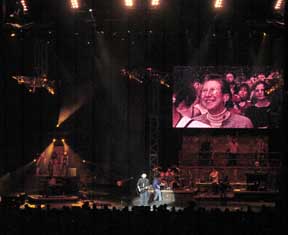 The concert went off without a hitch and my mom had a big thrill when her face appeared on the giant video wall, courtesy my friends on the video crew. A little while later the concert ended, the hall emptied, and after saying goodbye to my family and friends I rounded up a couple of crew guys to trek some band gear to the banquet room. As this was a rare two-nighter, all of the big production stayed in place, allowing this late night after party to begin at the early hour of 11 PM.
The concert went off without a hitch and my mom had a big thrill when her face appeared on the giant video wall, courtesy my friends on the video crew. A little while later the concert ended, the hall emptied, and after saying goodbye to my family and friends I rounded up a couple of crew guys to trek some band gear to the banquet room. As this was a rare two-nighter, all of the big production stayed in place, allowing this late night after party to begin at the early hour of 11 PM.
A short while later and the private banquet hall was filled with Toby Keith tour members, as well as the tours opener, Blake Shelton, and his entourage. The dinner on this night was all out – fresh Maine lobster and New York sirloin’s with an open bar as well, and Kelly and I enjoyed our share. Somewhere near the beginning of this night within a night, Toby made a brief speech, personally thanking everybody for helping make this particular tour one of the highest grossing country tours to date, somewhere in the neighborhood of $43 million. To show this appreciation, he announced that everyone would be receiving a special personalized plaque, and pointed to a table off to the side at which we could all acquire these special momentos.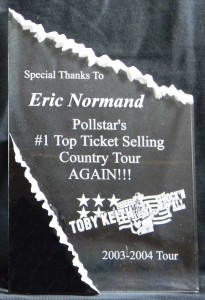
After dinner ended people began circulating around the room and the alcohol began to take effect, quickly kicking things up a notch. It didn’t take long for the music to begin and somehow, I was included in the one of the first rounds of this no holds barred jam-a-thon. To the best of my recollection this grouping consisted of Toby, his drummer, Dave MacAfee; Blake’s bass player; and me on electric guitar. We played with this group and for a half-hour or so, rendering a few rocking versions of barroom standards like “Keep Your Hands to Yourself”, “Old-Time Rock ‘n Roll”, and the Doobie Brothers classic “Long Train Running” in which I unleashed a feverish solo during the ending vamp. I must have played quite well, for after this last number, Toby, who hadn’t said anything more to me than the occasional “Hey brother” for the past eight months, turned to me and said “you just smoked both of my guitar players!”
Of course this comment landed me on cloud nine, and I’m sure Toby meant no disrespect towards his longtime guitar players, Rich and Joey, both whom are fine musicians. It was just one of those rare moments in life I had been waiting for, kind of a secret audition in my own mind, with Toby reacting genuinely to my over-the-top moment of guitar antics. Of course this short-lived “tech elevated to player” status yielded some great applause from my fellow crew members. All the other band members already knew I could play, but most of the crew guys had only heard me play some fragmented licks during the soundchecks. Judging by their comments afterwards and the next day they were genuinely excited to see one of their own crewmates ‘kick out the jams’, perhaps a few of them living vicariously through me in that unique moment.
After our set, I handed the guitar off to Joey, and Blake got up as well. Over the next couple of hours, everybody who wanted to play got to play. The party was still raging at 3 AM with a couple of tour members passed out in their seats by this point. Sometime around 4 AM it finally started to dwindle, and we headed over to the hotel room to sleep (one of the only times I didn’t sleep on a bus for the entire tour).
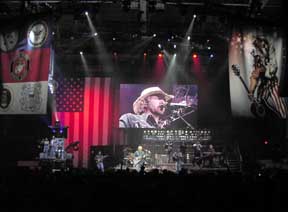 The next day we were all back to work getting ready for the final show, and many of the crew and band members were nursing significant hangovers. When Toby arrived for a brief sound check he again commented on my guitar playing with “you rocked last night!” I thanked him for the complement and we went about our day. Later that night our second show in Portland also went off without a hitch, and I said goodbye to everybody afterwards, as I was staying behind to visit family and friends.
The next day we were all back to work getting ready for the final show, and many of the crew and band members were nursing significant hangovers. When Toby arrived for a brief sound check he again commented on my guitar playing with “you rocked last night!” I thanked him for the complement and we went about our day. Later that night our second show in Portland also went off without a hitch, and I said goodbye to everybody afterwards, as I was staying behind to visit family and friends.
At that moment I assumed I would be continuing this gig when it started its next leg of touring that summer. But as fate would have it, another opportunity would soon present itself and the Toby Keith tour would be my one and only foray into the world of the guitar tech. I will be forever grateful for having that opportunity, for it yielded much knowledge, great memories, and many friendships. But my wish was about to come true and it wouldn’t be long before I would be standing up there on stages throughout the land, doing what I had set out to do, playing the guitar.
That said, I will never forget that special night in Portland!
Toby Keith Crew 2003/2004
Photos courtesy Brittany Allyn
The ever churning music scene of Nashville can be kind of quirky. Even though it has downsized a bit since its heyday of the booming 90s, it’s still a constant flurry of activity, with thousands of musicians of all levels and backgrounds continually searching and on the move. Searching for gigs, connections, opportunities, and quite often, searching for a pathway to a success that has yet to be defined. We’re all on the hunt for something more.
That’s how I felt when I first moved to Nashville, nearly 10 years ago. I didn’t really know exactly what I wanted to do here; I just knew I wanted to accomplish more than I had in my previous life as a nightclub performer and music teacher in New England. I can remember the sense of impatience and anxiety I felt during that first year, the endless thirst for musical activity – no gig was too big or small.
As a fresh arrival in 2002, I knew very little about how this place worked and relied on my friend and mentor “D” to fill in the blanks. “If you are looking for paying gigs, the country scene is where it’s at. It’s pretty much a freelance scene, but that’s where you’ll make the connections you’ll need to survive. Just get out there and start hitting the clubs and get to know people, sit-in whenever you can. But whatever you do, don’t join a band, bands starve.” All sound advice coming from a successful player who had already been here for 10 years.
“I’m really into blues and rock. Is there a scene here for that? I asked innocently. “There is, but you’re going to go broke if you only play that stuff here” was his reply “Plus you’ll get pigeonholed”. “Well if all this activity is basically hired guns, how do you just have a band for fun?” I asked, not wanting to accept this new fate. His solution was so simple – “After you get to know and become friends with some good players, just pick a night, book a gig, and go make some music with your buddies.”
While his advice made a lot of sense, it would take years for me to fully realize this new potential. I began digging in to the scene, networking, sitting in, and this approach worked. I played hundreds of gigs around the city during those first couple of years – Broadway gigs, Printers Alley gigs, gigs on the outskirts, showcases – you name it I played it. These gigs eventually lead to touring work and a couple of years later I began playing on songwriter demos too.
Now it’s 2011 and I’ve been here for nearly 10 years. I can’t believe how fast time flies, the last decade was a blur of endless activity. I didn’t move to Nashville to become a superstar or a songwriter, I came here to work as a player, and I’ve succeeded in that endeavor. I make my living (or the bulk of it) as a freelance musician, something I was not able to do prior to my Nashville days.
But something has still been missing and I just recently figured out what it was. I haven’t been playing music enough for the sheer joy of it. Nearly all of my music career dreams have come true. I’ve played in every state in the lower 48, Canada, parts of Europe; 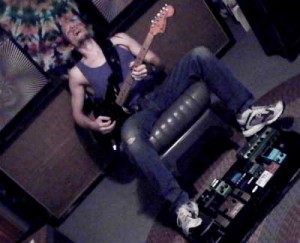 I’ve learned how to play guitar on recording sessions; I’m good friends with some of the finest musicians on the planet; I’m earning a living from my craft. But where’s the self-expression within all of this? Don’t get me wrong, there’s plenty of good music involved in what I do. But a lot of the music I do for pay is the result of somebody else’s expression, and at times, lacking a personal connection to me.
I’ve learned how to play guitar on recording sessions; I’m good friends with some of the finest musicians on the planet; I’m earning a living from my craft. But where’s the self-expression within all of this? Don’t get me wrong, there’s plenty of good music involved in what I do. But a lot of the music I do for pay is the result of somebody else’s expression, and at times, lacking a personal connection to me.
So last fall I finally decided it was time to follow ol’ Ds advice – “Pick a night, book a gig, and go make some music with your buddies.” I’m not sure if it’s just because I’m getting a little older and my priorities are changing, or because working as a freelance musician allows you to be a part of everything, without actually belonging to anything, but making some music for the soul on a regular basis with my friends is now a big priority for me.
While I’m making my living as a hired gun within the country side of this town, I have a new found love for my side project “Endless Boogie”, a band project that has no goal other than to simply provide me and my buddies with a night or two a month of self-expression through fun music. My good friends Fran Breen, drummer extraordinaire originally from Ireland (with the accent to prove it), and Mike Chapman, bad-ass bassist and member of Garth Brooks’ famed session band, the G-Men, were the first players I called for the gig. Even though they’ve both been here far longer than I, perhaps their love of just getting out there and playing is even more telling about working as a career freelance musician long-term.
A few months ago, when we did one of our first gigs at the Fillin’ Station in Kingston Springs, another player that new Mike walked in mid-set. He seemed surprised to see Mike on this “outside the microscope” gig and asked “What are YOU doing here?” Mike’s reply was honest and telling – “I’m playing.”
To me, this simple exchange says it all. What should have been obvious to the other fellow wasn’t. Not every gig has to be about money, prestige, or opportunity. While my buddies and I know the importance of a little music for the soul, it is easy to understand how a lifetime of working in the music industry can change that.
So what are you waiting for?
“Pick a night, book a gig, and go make some music with your buddies.”
Endless Boogie will be playing tonight, Tuesday, January 18 at the 12 South Tap Room, located next to Mafioso’s on 12th Avenue South, Nashville, TN. The show starts at 9 PM and we will be playing some of our favorites from Hendrix, Allmans, Santana, Muddy, and Miles, plus a few of our own. The tap room is one of the coolest “non-Nashville” bars in Nashville and has a great menu, friendly staff, a whole bunch of fancy beers on tap, and never a cover.
12 South Tap Room
2318 12th Ave South
Nashville, TN 37204
615-463-7552
One of the best things about working as a guitar tech on a major tour is that it provides you access to the world’s coolest guitar picks. When working on a high profile tour, there will be many occasions when you will share the bill with other national acts, be it award shows, multi-band festivals, and so on. As many artists and band members on this level get their own personalized custom picks by the gross, and their guitar tech is usually in charge of ordering and dispersing these picks, it’s only par for the course that the tech will have many opportunities to do a little pick trading with other techs and musicians.
During my time working as a guitar tech for Toby Keith, I came into possession of some real prizes. When we did a handful of shows with Willie Nelson, I traded some Toby picks with Willie’s tech and got a Farm Aid pick and a “Willie and The Dead – 30th 4th of July Picnic” pick, a couple of unique rarities. Somewhere along the way I met a tech who had worked with the Allman Brothers, and 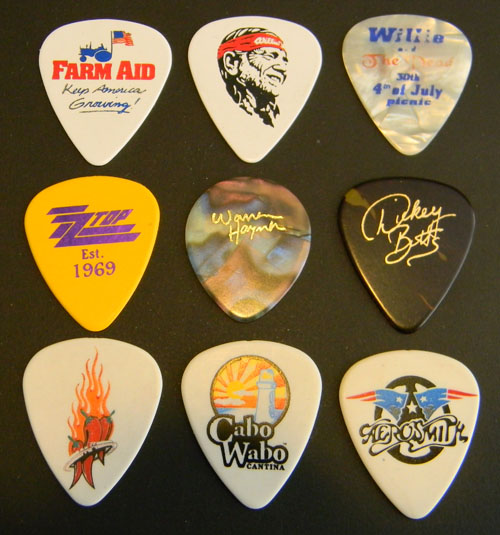 wound up with picks from Warren Haynes and Dickey Betts, two of my favorite guitarists. A few more standouts would be a Sammy Hagar “Cabo Wabo” pick, a Michael Anthony pick, and a rare Aerosmith/New England Patriots Commemorative Super Bowl pick.
wound up with picks from Warren Haynes and Dickey Betts, two of my favorite guitarists. A few more standouts would be a Sammy Hagar “Cabo Wabo” pick, a Michael Anthony pick, and a rare Aerosmith/New England Patriots Commemorative Super Bowl pick.
Pick trading among techs is common practice and a tradition that goes way back. Some acts and techs are very laid back about their guitar picks, and often will just give you one if you are working on one of these tours and simply ask. Other tours and techs might employ a stricter rule regarding the handing out or trading of picks, only doing so sparingly, or not at all. On the Toby Tour during my tenure, the pick policy was somewhat laid-back, so trading a few picks when a good opportunity presented itself was not frowned upon.
Sometime in the fall of 2003 the tour came to an indoor sports arena somewhere in Illinois. It was just after dinner time when I returned backstage to guitar world for my preshow tuning duties. I had just barely started to dig in when a tall and lanky fellow dressed in a flamboyant outfit approached me. “Hi, Rick Nielsen of Cheap Trick here. I just want to check out what you got.” It was kind of dark in the arena at this point, and I was a bit startled by this stark introduction that seemed to come out of nowhere. “I’m Eric, Toby’s guitar tech. Good to meet you.” I said as we shook hands. He briefly mentioned something about being a part owner of the hockey team that played in the arena, as well as being one of the owners of the arena itself, before taking a brief guided tour of our 22 guitars and basses. He seemed curious, but not overly impressed, which comes to no surprise as I had read that his collection of guitars once contained around 2000.
His demeanor was a little quirky, and his short bursts of fast-paced dialogue continued to keep me on edge. “Got any picks?” he asked out of the blue. “Yes, we sure do.” I answered. “Wanna do a little trade? How about 10 for 10?” he asked briskly. This was beginning to feel like some sort of back alley drug deal. “Sure, step on over to my guitar work box” I replied beginning to rummage through the drawers. Before I could even grab one pick from each of Toby’s collection for the trade, he had placed his picks on top of the work table. “Here you go.” I said a minute later handing him the picks. Not but a few seconds later he barked out in an almost accusatory tone “Hey, there’s only 7 here. I gave you 10. What are you trying to do?” and with this I began to have visions of buying a watch from some guy wearing an overcoat in an alleyway. “Oops, sorry. I didn’t realize you were actually counting” I awkwardly confessed, and reached into the draw for a few more picks. “Thanks.” He stated bluntly, and the picks were no sooner in his hand before he had disappeared from sight around the corner, into the blackness of the night.
Before this night I had traded a lot of picks, but none of my previous “deals” held this kind of weight, this was a first. Most techs don’t take their pick trading as seriously as this fellow did. This guy knew what he wanted, and he knew how to get it. You’ve got to respect that. He drove a hard bargain, and I have the picks to prove it!
Hey everybody, welcome to 2011! For all of you that have been following the progress on my book project, here’s a little update:
We have now achieved an interior design! After a couple months of hard work and a steep learning curve, Kelly has mastered the basics of Adobe inDesign, a powerful document designing program. A few months ago I posted a Craigslist ad to find and enlist the help of an Adobe inDesign expert and, after responding to several inquiries, hired a very well-qualified Nashville based designer to help us learn this program. A few phone tutoring sessions and e-mails later, and Kelly, already a great Web designer with a deep knowledge of computer graphics, understood the program well enough to teach me the basics. Together, we arrived at a design that we feel is right for this book.
Here are a couple of sample pages (click on the image to view full screen):
I can’t tell you how exciting it is to finally see my endless stream of Word documents begin to look like a book. At last, there is a light at the end of the tunnel!
I’ve compiled some great photos for this book. After year and a half of writing and conducting interviews, the book is quite massive, currently weighing in at 120,000 words, or somewhere between 350 and 400 pages. To help the book stay visually stimulating with this much text, I felt it was important to include as many pertinent photos as possible, not only to help break up the text, but also to give any readers who are considering moving to Nashville a greater sense and feel of this place. After about five or six photo taking “field trips” into Nashville Metro, I’ve compiled about 1000 pictures from which I am choosing the best 100 or so for the book. I’ve also gone through my hard drive and picked out the best shots I’ve accumulated from my decade of working in the Nashville music industry, and have received a few great contributions from my interview subjects as well.
The EJ Bernas interview is now edited and approved. This interview with the senior director of UMG Southwest region, the last and longest interview I conducted, takes an in-depth look at some of the thought process that goes into signing new acts, and reveals much about what goes into developing an artist in this post-Napster era. After making a few adjustments, EJ has now approved this document, and the interview is now officially a part of the manuscript.
Copy editing is now underway. After reviewing the same material over such a long period of time, I don’t know if I could spot anymore mistakes, but I know there are more to be found. For instance, did I place all those commas correctly? Comma’s are a bitch, and, I, sometimes, get confused, as to how many to use,,,;) So we’ve enlisted some outside help for a fresh perspective.
We have chosen Amazons Create Space for POD (print on demand) services. A traditional printer would require at least 1000 books for a minimum run, and that would be a lot of cash out of pocket. The good news is that now, in the day of self-publishing, POD services like Create Space and Lulu have helped greatly in this regard. I am, however, planning a first print run of 500, so I will still have to come up with a good chunk of change. (Donations anyone?)
We now have a target release date – March 14! If everything goes according to plan, the book will be available for purchase on Monday, March 14, in both paperback and e-book formats through this website and at Amazon.com. It will also be for sale at several music stores, bookstores, and tourist shops around middle Tennessee. There is still a ton of work to be done to make this happen over the next two months – completing the interior, making the necessary copyedit changes, creating the e-book, setting up a P.O. Box and phone line, designing the back cover and spine, assessing and purchasing shipping containers, annoying Kelly with my endless onslaught of computer related questions, stressing, pacing needlessly around the house, and a lot of freaking out in general.
Thanks for reading, and keep checking back for more news about the release of “The Nashville Musician Survival Guide”. I assure you, it will well be worth the wait!
